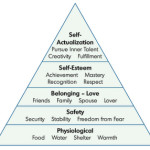Moladi – Imagination For People – Social Innovation For The Bottom Of The Pyramid
 designmind. August 2013. About the project
designmind. August 2013. About the project
The aim of empowering people at the Bottom of the Pyramid is to identify appropriate technical solutions in order to tackle basic needs in developing countries. But what are basic needs exactly?
In 1943, Abraham Maslow presented his well-known “hierarchy of needs”. According to his theory, people need food, water, sleep and warmth the most. These are considered to be basic needs and it is only when these basic physical requirements are met that individuals can progress to the next level, that of safety and security. Once these needs are fulfilled, interpersonal needs such as love and friendship, as well as the need for self-esteem and respect from others, can gain importance. Self-fulfilment and the realization of one’s own potential represent the top of the hierarchy.
What does Maslow tell us? Food, sanitation and shelter are not only mandatory preconditions for survival – they also lay the foundations for the personal development of an individual. People can only grow and develop if they don’t suffer from basic supply problems: Children in school simply cannot learn on an empty stomach and the social and economic development of communities depends on access to safe water and sanitation services.
Today, the basic needs approach has become an integral part of theories about human motivation, social and economic development, particularly in the context of development in low income countries. It has become one of the major approaches to the measurement of what is believed to be an eradicable level of poverty and it also forms the center of people-focused development strategies. The “basic needs strategy in development planning” by the ILO (1976), for instance, calls for giving priority to meeting minimum human needs, providing certain essential public services, and also stresses the importance of citizen participation in the determination and tackling of needs. Citizen participation, economic growth, globalization and technology are all intertwined in these development approaches.
The definition of basic needs within the framework of empowering people therefore also encompasses food, water, shelter (moladi), sanitation, education and healthcare. The use of technology in concert with social entrepreneurship to improve the quality of life and social structures.
Read more: http://www.designmind.co.za/for-the-bottom-of-the-pyramid